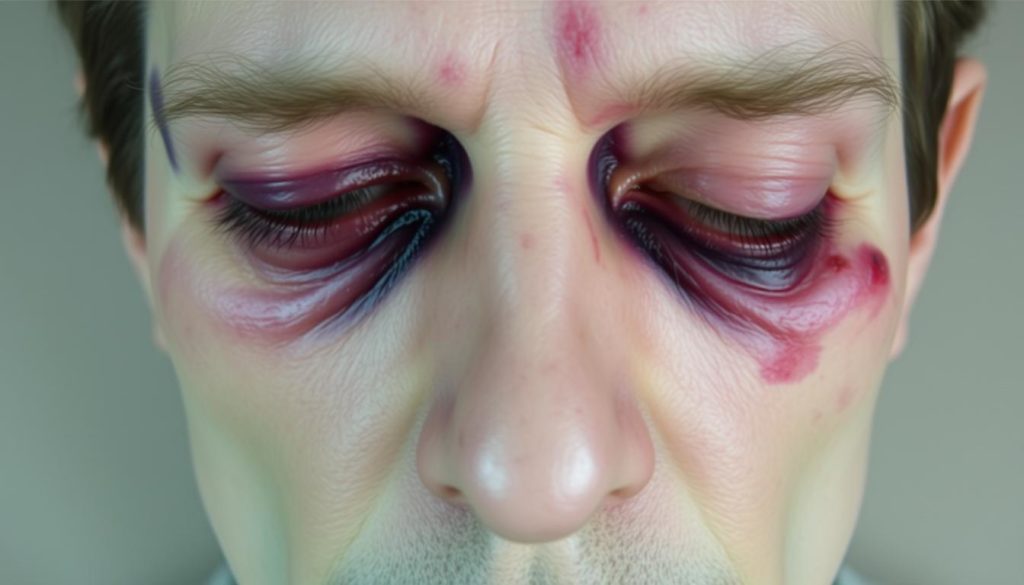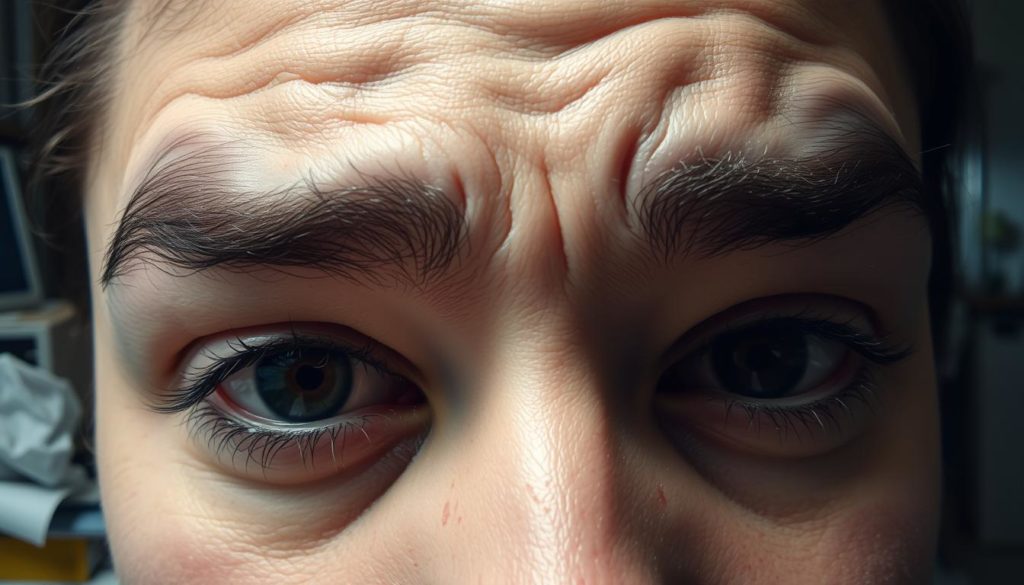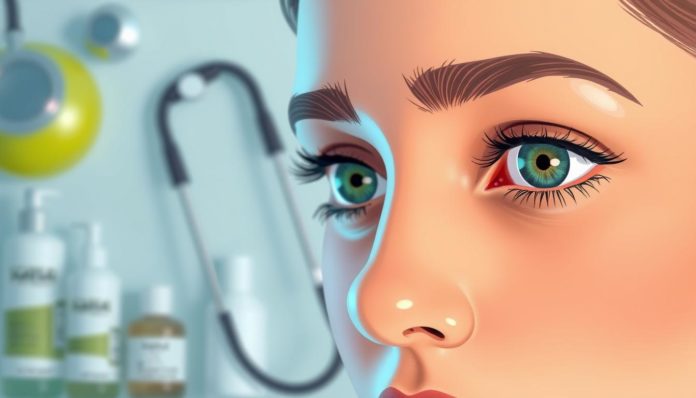Raccoon eyes, or periorbital ecchymosis, can show up within a day after a head injury. These dark circles are more than just ugly—they could signal serious problems.
These bruises look like a raccoon’s face and show why it’s crucial to get medical attention right away. Knowing what causes them and how to treat them can really help cut down on recovery time. They might be caused by a skull fracture, amyloidosis, or some types of cancer. Let’s look into the different treatment options and what steps to follow for the best care.
Understanding Raccoon Eyes (Periorbital Ecchymosis)
Periorbital ecchymosis, also known as raccoon eyes, features bruising around the eyes. It’s mostly due to facial trauma and might suggest internal bleeding is happening. The affected area first turns red, then darkens to purple or black based on severity.

Diagnosing raccoon eyes is key, as many factors can cause them. Pinpointing the exact reason helps in treating it right. Head injuries, fractures, and some medical issues are common causes.
To help understand the symptoms, how they change over time, and ways to diagnose, see this table:
| Symptom | Description |
|---|---|
| Initial Redness | The area around the eyes becomes reddish initially. |
| Darkening | The bruising grows darker, turning purple or black as it worsens. |
| Underlying Causes | Often related to facial trauma, but checking for other conditions like amyloidosis or cancer is vital. |
| Diagnosis | It’s important to undergo a complete medical check-up, often with imaging tests, to find the cause and extent. |
Quick action not just eases the visible signs but helps catch and treat any serious issues underneath. Staying in touch with medical pros is best for recovery and avoiding more problems with periorbital ecchymosis.
Common Causes of Raccoon Eyes
Raccoon eyes, or periorbital ecchymosis, come from many conditions. They can be from injuries or diseases.
Basal Skull Fracture
A basal skull fracture is a key cause of raccoon eyes. This happens when the skull’s base breaks. Fluid then leaks around the eyes, causing dark discoloration.
Facial Fractures
Broken noses or orbital fractures also cause raccoon eyes. These might happen due to falls or sports. They cause dark bruising around the eyes.
Amyloidosis
In amyloidosis, abnormal proteins pile up in the body. This buildup near the eyes can make bruises. It gives the eyes a raccoon-like look.
Certain Cancers
Some cancers, like neuroblastoma, show up as raccoon eyes. This usually happens in younger patients. The cancer damages small blood vessels, causing bruises around the eyes.

Symptoms Associated with Raccoon Eyes
Raccoon eyes are known as periorbital ecchymosis in medical terms. They show clear signs that help doctors find the cause. Most often, you’ll see swelling and changes in skin color around the eyes.
Swelling and Discoloration
Swelling around the eyes with dark discoloration is common. This can look purple to black. Trauma often causes swelling, needing quick treatment for a black eye. How severe the swelling and discoloration are can hint at orbital cellulitis.
Additional Symptoms Based on Underlying Condition
Other signs like blurry vision, hearing loss, high blood pressure, or a quick heartbeat might show up. These symptoms reveal how serious the issue is and help doctors figure out the exact cause. Pain and tenderness could mean a serious infection like orbital cellulitis, which needs fast action.
Diagnosing Raccoon Eyes
To figure out raccoon eyes accurately, we need to know what’s causing them. It starts with a deep physical examination.
Physical Examination
In the physical examination, doctors check many things. They look at how the eyes move and feel around the area. This helps them understand why the raccoon eyes appeared.
They also do other health tests. These are to make sure there aren’t more serious issues.
Imaging Tests
CT scans are a key step for more details. A CT scan shows a clear picture of the skull. This lets doctors spot fractures or tumors that a physical examination might miss.
By using both physical checks and scans, doctors can make a precise diagnosis. This leads to the right treatment for raccoon eyes.
Immediate Treatment Options for Raccoon Eyes
If you have raccoon eyes, quick action is important. The first step is to treat the main injury causing the bruising. Knowing when to get medical help matters a lot. This is key if you think there’s a severe issue like a skull fracture.
- Rest and immobilization to prevent further injury.
- Applying a cold compress to reduce swelling and discomfort.
- Careful monitoring for signs of worsening conditions or complications.
- Ensuring the patient stays hydrated and nourished to support healing.
Sometimes, you might need more medical help. That can involve:
- Getting X-rays or CT scans to see how bad the injury is.
- Surgery if the breaks or bleeding are really bad.
- Taking medicine to help with pain, swelling, or infections.
Being careful and seeking immediate care quickly can make a big difference in getting better. It’s always best to focus on treating head injuries right away for safety and healing.
Long-term Treatment and Management
Long-term care for raccoon eyes means tackling the root cause. It’s about both looks and health. Here’s a rundown on treating conditions that cause raccoon eyes over the long haul:
Treatment for Skull and Facial Fractures
For skull and face breaks, treatment varies. It might include surgery. The main aim is to fix the breaks and help healing.
How long recovery takes depends on how bad the injury is. Quick, right care is key. It lowers risks and helps get back to normal.
Managing Amyloidosis
Amyloidosis is when amyloid proteins build up too much. Careful, continuous care is needed. Treatment often involves drugs to lessen amyloid production and ease symptoms.
Keeping a close watch and tweaking the treatment plan are crucial. This helps handle the condition well and shortens recovery time.
Cancer Treatments
If raccoon eyes are due to cancer, specialized cancer treatments are crucial. Options may include chemo, radiation, or targeted treatments, based on the cancer type and stage.
A good facial trauma management plan looks at the big picture of a patient’s health. It focuses on personal care and close monitoring. This can improve recovery and life quality.
Preventing Complications from Raccoon Eyes
Regular medical follow-up is essential to prevent issues from raccoon eyes. See your healthcare provider often to catch and treat any new symptoms quickly.
If you have raccoon eyes from an injury, watch out for signs of meningitis, leaks of cerebrospinal fluid, and aneurysms. These problems can happen fast and might need quick help from your healthcare provider.
- Sign of Meningitis
- Cerebrospinal Fluid Leaks
- Aneurysms
When dealing with amyloidosis or certain cancers, sticking to your treatment plan is vital. Regular visits to the doctor are key in preventing complications and making necessary changes to your treatment on time.
Your healthcare provider may suggest ways to prevent further problems. This can include changing your medicine or your lifestyle. These actions are important for lowering risks and helping you get better.
| Condition | Preventive Measure | Healthcare Provider Role |
|---|---|---|
| Meningitis | Regular monitoring | Early diagnosis and treatment |
| Meningitis | Monitor for fluid leaks | Perform corrective surgery if needed |
| Amylodosis | Adhere to therapies | Adjust treatment plans |
| Cancer | Follow surgical aftercare | Monitor recovery progress |
When to Seek Medical Attention
Raccoon eyes may signal serious health issues. Knowing when to call the doctor is key. See a doctor right away if you have unexplained bruising around your eyes. This is very important after a head injury or if you feel sick with headaches, nausea, or confusion.
Getting medical help early can really make a difference. Here’s when to contact a healthcare professional:
- Severe headache or constant dizziness
- Unexplained bleeding or swelling
- Vision changes or passing out
- Other symptoms like nausea or confusion
Be alert and know when to call the doctor. If you think there’s a serious problem causing raccoon eyes, don’t wait. Watching symptoms closely and getting help fast is best.
Here’s a quick guide to know how urgent your symptoms are:
| Symptom | Action Required |
|---|---|
| Severe headache | Seek immediate medical care |
| Nausea and vomiting | Call the doctor right away |
| Unexplained bruising | Seek medical attention promptly |
| Confusion or disorientation | Contact a healthcare provider immediately |
Knowing when to call the doctor helps manage symptoms well. It avoids worse health issues. Always put your health first by seeking medical care when unsure about symptoms or their severity.
Raccoon Eyes Causes and Treatment (repeated section, might have been an oversight in the outline provided)
Dealing with raccoon eyes can seem tough. But, knowing what causes them and how to treat them helps a lot. Raccoon eyes, or periorbital ecchymosis, come from things like skull fractures, facial injuries, amyloidosis, or even cancer. Finding the root problem is key to treating them right.
The treatment for raccoon eyes varies based on the cause. Severe issues like skull fractures need quick medical help. Other causes like amyloidosis or cancer need special treatments designed for the patient. Usually, early steps might include:
- Applying cold compresses to reduce swelling
- Ensuring rest and elevation of the head
- Pain management using prescribed medications
If raccoon eyes are from an injury, watch for more symptoms and get checked by a doctor quickly. Always talk to a healthcare expert for the right diagnosis and treatment plan.
Understanding Different Types of Facial Trauma
Facial trauma often leads to raccoon eyes. This is usually due to injuries that cause orbital and nasal fractures. Both can greatly affect how one looks and functions. Thus, understanding and treating these injuries is crucial.
Orbital Fracture
An orbital fracture is when the bones around the eye socket break. Symptoms include swelling, bruising, and seeing double. It’s crucial to diagnose and treat these quickly. In severe cases, surgery may be needed to make things normal again.
Nasal Fractures
Nasal fractures, or a broken nose, occur when the bone or cartilage of the nose breaks. They are painful and can make it hard to breathe. They can also permanently change the way one looks if not treated right away. Doctors use a physical exam and an X-ray to see how bad the fracture is. Then, they decide on the best treatment.
| Type of Fracture | Symptoms | Treatment |
|---|---|---|
| Orbital Fracture | Swelling, bruising, double vision | Rest, ice packs, surgery (if severe) |
| Nasal Fractures | Pain, breathing issues, facial disfigurement | Physical examination, X-ray, possible surgery |
Frequently Asked Questions about Raccoon Eyes Causes and Treatment
Dealing with raccoon eyes? Here are some FAQs covering essential raccoon eyes information. You’ll find answers to the most common questions regarding its causes and treatments.
Raccoon eyes, also known as periorbital ecchymosis, often come from skull or facial fractures. Conditions like amyloidosis or certain cancers might lead to them too.
How are raccoon eyes diagnosed?
Doctors usually start with a physical check and imaging tests. They might use CT scans or MRIs to figure out the exact cause.
What are the symptoms of raccoon eyes?
Signs include swelling and discoloration around the eyes. Other symptoms can appear, depending on what’s causing the condition.
What are the immediate treatment options?
First steps in treatment aim at keeping the patient stable. Cold compresses can help with the swelling.
How are long-term treatments managed?
Dealing with the root cause is vital for long-term care. Surgery might be needed for fractures. Conditions like amyloidosis or cancer often need special treatments.
| Common Questions | Answers |
|---|---|
| What should I do if I suspect I have raccoon eyes? | Seek immediate medical attention, especially if the condition resulted from trauma. |
| Can raccoon eyes be prevented? | Preventing the injuries or conditions that lead to raccoon eyes is key. Use protective headgear during high-risk activities. |
| Are there any complications related to raccoon eyes? | If left untreated, the underlying conditions can lead to serious health issues. Proper diagnosis and treatment are crucial. |
| How long does it take for raccoon eyes to heal? | Healing time varies based on the severity and cause but typically ranges from a few weeks to several months. |
Natural Remedies to Alleviate Raccoon Eyes
Some conditions that cause raccoon eyes may need a doctor’s care. But for less serious issues, natural remedies can help. They are good for treating a black eye and lowering swelling. Using them can speed up the healing process.
Cold Compresses
For a black eye, applying a cold compress is a top method. It lessens blood flow to the area, helping with swelling. Just take a few ice cubes or frozen peas, wrap them in cloth, and place it over the eyes for a bit. Do this several times a day.
Elevation and Rest
To aid recovery from raccoon eyes, keep the head up, especially when sleeping. Make sure to get plenty of rest too. Keeping the head raised reduces blood flow, which helps with swelling. Also, resting lets your body focus on healing, especially when paired with other natural remedies.
Conclusion
Raccoon eyes are more than a beauty problem. They might mean there’s a serious health issue underneath. This comprehensive guide sheds light on the causes, symptoms, and many treatments available. It’s key to understand what’s causing them to decide the best treatment.
Quick action is crucial, especially with head injuries needing fast help. Urgent steps like a CT scan or surgery can hugely affect recovery. Also, doing things like using cold packs to reduce swelling and watching for symptom changes can help during recovery.
It’s important to manage and lessen complications for complete healing. Knowing how to take care of yourself and understanding when to see a doctor are key for a smoother recovery journey. For more info on managing raccoon eyes, check out WebMD’s detailed look at them. Immediate medical care combined with proactive self-care leads to better long-term health, making it easier to deal with this issue.
FAQ
What are raccoon eyes?
Raccoon eyes are dark bruises around the eyes. They look like the markings of a raccoon. These marks are signs of internal bleeding under the skin, not an illness itself.
What causes raccoon eyes?
They can happen from serious injuries that break bones in the skull or face. Diseases like amyloidosis and some cancers can cause them too. Even allergies or surgeries, such as nose jobs, may lead to raccoon eyes.
How are raccoon eyes diagnosed?
Doctors diagnose them by examining the patient closely and using scans like CTs. This helps find the main cause. It ensures the treatment is right and started quickly.
What symptoms are associated with raccoon eyes?
Besides dark bruising, there might be swelling. Other signs like blurry vision, hearing loss, high blood pressure, and changes in heart rate can occur, depending on the cause.
What are the immediate treatment options for raccoon eyes?
Treatment first aims to fix the cause of the bruising. This might mean treating head injuries, handling diseases, or surgery for broken bones.
What are some long-term treatment and management options for raccoon eyes?
Long-term care could involve surgery for breaks, treating amyloidosis, and cancer treatments. Managing these well is important for looking better and for overall health.
How can complications from raccoon eyes be prevented?
To avoid problems, follow your doctor’s advice closely. Watch out for serious issues like meningitis and fluid leaks. It’s also key to take care of any ongoing health issues.
When should I seek medical attention for raccoon eyes?
Get help right away if raccoon eyes show up suddenly, especially after hitting your head. Also, see a doctor if you experience headaches, nausea, confusion, or feel very tired.
Are there natural remedies to alleviate raccoon eyes?
For minor cases, trying cold compresses might help with swelling. Resting and keeping your head up can also speed up healing. Remember, these are to be used along with medical treatments if needed.
What is facial trauma and how is it related to raccoon eyes?
Facial trauma means injuries to the face, like broken bones around or in the nose. These can lead to raccoon eyes. Treating these injuries properly is vital to avoid lasting damage.


